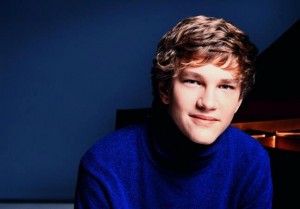CLASSICAL MUSIC: 17-year-old concert pianist an ‘old soul’
 Asked what kind of music he likes outside of classical, piano wunderkind Jan Lisiecki doesn’t hesitate, “I love Pink Floyd.”
Asked what kind of music he likes outside of classical, piano wunderkind Jan Lisiecki doesn’t hesitate, “I love Pink Floyd.”
Good answer, kid. He says it “takes him back.”
So what’s more amazing – that a teenager loves Pink Floyd, or that a teenager has reached international fame as a master concert pianist? On stage at the Winspear Centre on Friday as part of the Les Choralies Internationales Edmonton 2012, you could call the Calgary musician the Justin Bieber of classical music – if he didn’t laugh at the very idea, “If you compare my 7,000 fans on Facebook to how many billion he has, I don’t think so.” One for every person who’s ever lived on Earth, apparently.
Teenage pop stars don’t face the same sort of questions the classical prodigies do. No one uses the word “prodigy,” for one thing, as if they were freaks of nature, or wonders if their parents forced them to practice seven hours a day when all the other kids were out playing video games. Turns out Lisiecki did it all on his own. No time for video games. Serious by the age of nine, he was amazing when he was 13, and has since tackled the toughest cadenzas from the heaviest composers with the most respected orchestras in some of the world’s most famous concert halls.
Lisiecki is familiar with all the usual questions. The obvious one is how he managed to get this good so young without giving up a so-called “normal” childhood.
He responds, “What is normal? There are so many things that are different in each person’s life. Some people have the privilege of being born in Canada, others in countries where they can’t even go to school. For me, I have the privilege to do what I truly love.”
Lisiecki is also well aware of the bias against young classical musicians, that they can’t possibly have the depth of life experience to deliver the emotions crucial to performing the classical masters, despite the amazing chops. Here, it seems, is an exception.
“I feel on one hand that music doesn’t have boundaries of age, but on the other side, it’s about what you feel with the music – and that changes with age,” Lisiecki says. “So you find a balance. I’m not sure why I have the luck of what people call an old soul. It’s something I was given and I simply have now.”
There’s a YouTube video (see below) that features the then-14-year-old Lisiecki killing Chopin, if killing is the appropriate term for such virtuosity. It’s clearly meant to impress, to make jaws drop, but now – three years later and much taller – Lisiecki insists that technical proficiency on its own is never enough.
“I’m not trying to evoke emotions purely on technique and speed and brilliance,” he says. “That’s very superficial. Those are not emotions that come from the heart. What I try to do is show how beautifully the piece was written.” So sure, there’s going to be some spectacular playing here and there, he adds, but there’s a big difference between being a technician and being an artist. Lisiecki speaks with authority about his opinions on masters like Glenn Gould – “only a few bars and you know exactly who it is” – and on the lineage of the masters, “These composers were inspired by one another, in many cases. Bach inspired Mendelssohn, he inspired Chopin, many composers looked up to him. And if you listen to the first few pieces that Beethoven wrote, they were in Mozart’s style, but then he grew into who we know him for.”
Both Mendelssohn and Mozart, by the way, were child prodigies.











